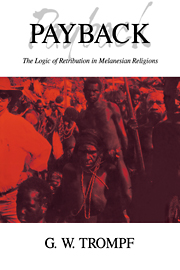Book contents
- Front Matter
- Contents
- Illustrations and tables
- Preface
- Abbreviations
- Preliminaries: The Theory of Retributive Logic
- Part One 'TRADITION'
- Chapter 1 Revenge
- Chapter 2 Reciprocity
- Chapter 3 Integrating and Explaining Significant Events
- Part Two 'CARGO CULTISM'
- Part Three 'MODERNIZATION'
- Conclusions and Recommendations
- Bibliography
- Index of Melanesian Cultures
- General Index
Chapter 3 - Integrating and Explaining Significant Events
Published online by Cambridge University Press: 22 September 2009
- Front Matter
- Contents
- Illustrations and tables
- Preface
- Abbreviations
- Preliminaries: The Theory of Retributive Logic
- Part One 'TRADITION'
- Chapter 1 Revenge
- Chapter 2 Reciprocity
- Chapter 3 Integrating and Explaining Significant Events
- Part Two 'CARGO CULTISM'
- Part Three 'MODERNIZATION'
- Conclusions and Recommendations
- Bibliography
- Index of Melanesian Cultures
- General Index
Summary
‘Payment’ in the form of gifts and sacrifice ostensibly constitutes ‘positive’ activity to heal breaches brought on by antagonism or unbalanced relations; war and sorcery, by contrast, are exercises of ‘negativity’ (cf. Gouldner 1960: 161–66; Sahlins 1965: 139–49; 1972: 191; Schwimmer 1973: 6, 111–12). We are now to see how the two profiles of Melanesian life can be juxtaposed and interconnected in a given complex of ‘payback logic’, so that instead of considering cultural components, one society is analysed in more depth to illustrate the integrative power of retributive principles. Erik Schwimmer has produced an ethnography eminently suited to this purpose, following his research on the Sangara, a mountain Orokaiva group of east Papua. Although Schwimmer's work was undertaken well after contact, he has still been able to educe certain notions of mediation and opposition underpinning the traditional Orokaivan mine (exchange system), and to show how they were key aspects of a coherent understanding. His openness to symbolism, mythological charters, and the various implications of reciprocal activity also allows him to explicate the mine in broadly socioreligious rather than narrowly economic terms.
Positive and negative reciprocity interrelated: a case study—Orokaiva
Putting it succinctly, the mountain Orokaiva conceive all significant social intercourse to be commenced and maintained by the mediation of gifts, and ‘they ascribe all breakdown in social relations to an antecedent breakdown in exchange relations’ (Schwimmer 1973: 49).
- Type
- Chapter
- Information
- PaybackThe Logic of Retribution in Melanesian Religions, pp. 128 - 154Publisher: Cambridge University PressPrint publication year: 1994



